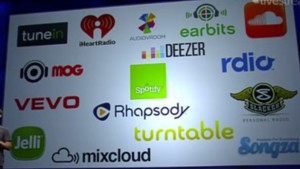In this third post I continue my research on related or similar sites that exist. One site that is used to promote lesser known musicians is the site bandcamp. Not only can you discover new music but you can also pay the musicians too. The site noted that in 30 days $3.4 million was paid to artists on the site. However, we should look at how other social media sites dedicated to music have come and gone and learn from it. One these is mySpace, while it is still in use, it is not as popular as it was when it first emerged in 2005, helping to launch the career of some artists.
“Mismanagement, a flawed merger, and countless strategic blunders have accelerated Myspace’s fall from being one of the most popular websites on earth—one that promised to redefine music, politics, dating, and pop culture—to an afterthought. But Myspace’s fate may not be an anomaly. It turns out that fast-moving technology, fickle user behavior, and swirling public perception are an extremely volatile mix. Add in the sense of arrogance that comes when hundreds of millions of people around the world are living on your platform, and social networks appear to be a very peculiar business—one in which companies might serially rise, fall, and disappear.”
Felix Gillette, Bloomberg Business
In addition one social media site that more recently went bust in 2014 is Jelli an interactive radio broadcasting service that was launched in 2009 and ended in 2014, when it changed its business platform towards its cloud based sales products for radio stations. Listeners selected songs for a radio station and could vote on songs to determine the playlists of their online streaming stations and participating radio stations. Winning songs were played on the radio, while songs that “Sucked”, were pulled off the air immediately. In a ‘Jelli chat room’ listeners could socialize, request their favorite songs, and organize a community-controlled playlist. The User of the Week award along with an accompanying badge for their profile page could be earned by helping to shape the playlist, and voting. they can request a “sigtone“, or short, 5 second sound clip that is played before one of the most favored tracks is played on the air. Lessons can be learnt from the experience of Jelli in the development of miXXerS.
Party/Concert websites tend to promote their websites independent of music websites. Many also tend to promote not just music events but entertainment more broadly for example Eventim, or Timeout. It also becomes difficult to find lesser known parties in your area that you may want to attend. Furthermore there is not usually a rating system for parties and concerts, reviews usually come web 1.0 sites.
In addition it may be the case that even though you do not usually attend parties and concerts you may want someone to play music at your party but have no idea where to find one that fits your taste or know if they will be good since reviews are not available online. You therefore have to depend on word of mouth.
However, while all of these sites exist they do not integrate DJs and small independent musicians with users particular those who attend concerts and parties. Given live music is still important there is an opportunity to facilitate connections in a very unique way which gives market share to independent artists but not to DJs and enhance the experience of those attending concerts and going to parties. Many of these sites also do not enable deeper social connections with these artists or meaningful rewards and so this is an area than be further explored through miXXerS.

